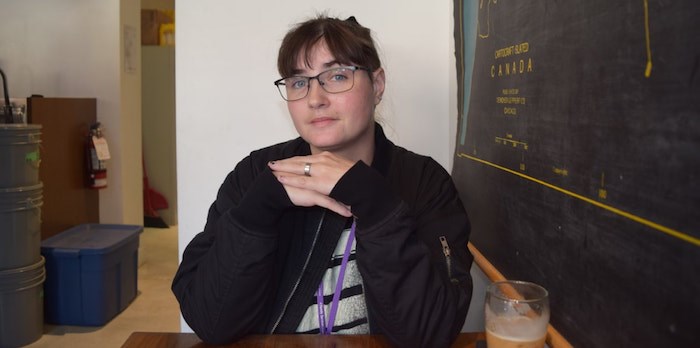The Vancouver Care Project is the work of 17-year-old Rachel Way, who engages with some of Vancouver’s most vulnerable residents facing poverty and homelessness. Each week she shares the story of one person she has met.
The purpose of this project is to share the stories of the lives of those living and working in and around Vancouver’s Downtown Eastside, as well as the homeless and marginalized population of Vancouver. By creating a virtual story book, the goal is to end the stigma that surrounds the area and raise awareness to the struggles the people of the area face.
Phoenix: TK
 Phoenix (Photo by Rachel Way)
Phoenix (Photo by Rachel Way)
I met with the Operations Manager of Directions Youth Services, Phoenix, in a coffee shop in Downtown Vancouver. Phoenix shared with me interesting information regarding her work at Directions and also her own story of overcoming addiction and homelessness.
Directions is a collection of services offered to youth who are dealing with homelessness. Their valuable services provided to nearly 500 youth every year include two youth homes; 10k, which is a floor of supportive housing in the Kettle building; their 24 hour Resource centre and a safe detox centre; as well as many outreach programs. Directions meets youth where they are at and helps them to overcome the various challenges in their lives.
Phoenix began her work with the organization as a peer support worker and moved her way up in the organization. Although she had never been through Directions herself, she was able to empathize with the youth as she has dealt with her own bout of homelessness, mental health issues, and addiction as a teenager.
Phoenix spent nearly six years being homeless after she moved out of her parents' house at the age of 16. Her homelessness, however, was what is referred to as "hidden homelessness," as she spent her years couch surfing. She left her parents house to make it easier on her impoverished family, she explained, so that they would not need to feed her. She reflected back that it probably wasn't the best choice at the time but she was doing what she thought was best for her family, a decision that I would imagine took a lot of courage.
Phoenix also shared with me that during her time being homeless she dealt with many addictions and mental health problems. Her addictions began when she was as young as 12, using LSD as a regular party drug. When she began using heroin on a daily basis at the age of 15, she became addicted in as little as two weeks and it became evident that she was self medicating to cope with her traumatic childhood.
But after years of hard work and dedication Phoenix has now been sober for 10 years. She began to realize that her lifestyle was not sustainable and wanted to make a change in her life. The major people that had an influence on her recovery she shared, where her husband, her mother-in-law and most importantly herself. Phoenix now devotes her life to helping those that were in a similar situation to her own and I'm sure is seen as a role model amongst the youth that she works with.
When I asked Phoenix what the most challenging part of her work was, she responded it is the opioid crisis and the amount of youth they have lost to overdose. Before the opioid crisis the organization would usually lose around three to four young people a year to overdose, suicide, illness, or other causes.
Now, she explained, they lose a couple of people every month and it seems that every other week they lose a youth to overdose. She explained that it is getting better now with all of the harm reduction that is available to people, but it is still devastating to the community and there is a long way to go until things are better.
Phoenix spoke of the community that exists amongst the youth of the program and how they all watch out for one another. "It's really neat how even people of rival gangs can come together and put their differences aside to share a meal," she said. She is constantly inspired by the youth and their courage as well as the staff and their passion and dedication to the program. I really admire Directions and Phoenix for their hard work in helping the youth living on the streets and their commitment to helping those in need.
This post originally appeared on The Vancouver Care Project and is edited and republished here with permission from the author.


